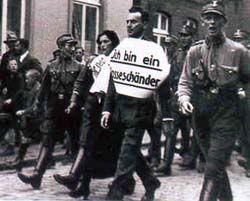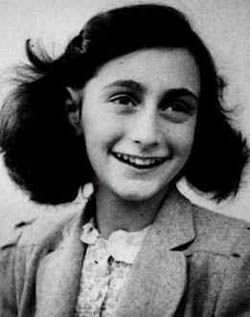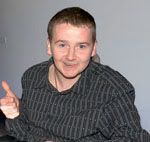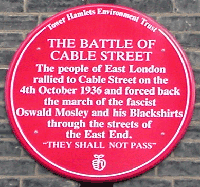
I don't often to to hospital for non-medical purposes, but today Maxima and I went to Cambridge's Addenbrookes Hospital to see an Anne Frank exhibit in the Treatment Centre. The hospital's now so big that it provides a rather large car called a "courtesy bus", which took us round the huge campus to the centre, aka Institute of Metabolic Science.
The exhibition was in the form of two sets of photos on screens, starting with the dire econimic situation in post-Versailles Treaty Germany, which bred resentment against the Allies, which Adolf Hitler took advantage of in the years following his outburst at a meeting of Anton Drexler's German Workers' Party (Deutsche Arbeiterpartei)persuading him to prefix Nazionalsozialistische: the Nazis had been born.
The presentation stressed that the majority of Germans were unaware of the true agenda of the Nazis until after their election in 1933. After this point, the exhibition grew ever darker, and you would see groups of nurses, physiotherapists etc gathering round words and pictures in silence. It related that 80,000 handicapped people were killed in order to prevent "enfeeblement of th
 e race"; another photo showed a Jewish man, Julius Wolff, being driven down the street by SS soldiers alongside his "Aryan" girlfriend Christine Reemann in Norden in 1935, each bearing signs that said "I am a defiler of the race".
e race"; another photo showed a Jewish man, Julius Wolff, being driven down the street by SS soldiers alongside his "Aryan" girlfriend Christine Reemann in Norden in 1935, each bearing signs that said "I am a defiler of the race".Interspersed with the indications of mounting horrors were the lives of Anne and her family, who moved from Germany to the Netherlands in 1933. In 1940, their country of exile was occupied and they took to hiding in rooms behind the business where Anne's father had worked, which she called "the secret annexe" - which was the original title of the book. One of the families foremost helpers and concealers was Miep Gies, who said:
'It seemed perfectly natural to me. I could help these people. They were powerless, they didn't know where to turn. I always emphasize that we were not heroes. We did our duty as human beings: helping people in need.
 I stood looking at the quote underneath her picture for a couple of minutes, unable to speak. There were further details of how, even in the summer heat, Anne and her companions had to burn leftovers to destroy evidence of their clandestine existence. Another quote from the diary referred to the five books that Ms Gies, who recently achieved her century, brought them form the library every Saturday: "We long for Saturday because that means books". However, the quote that moved me most was underneath the world-famous picture of Anne gazing into a future that she would never see:
I stood looking at the quote underneath her picture for a couple of minutes, unable to speak. There were further details of how, even in the summer heat, Anne and her companions had to burn leftovers to destroy evidence of their clandestine existence. Another quote from the diary referred to the five books that Ms Gies, who recently achieved her century, brought them form the library every Saturday: "We long for Saturday because that means books". However, the quote that moved me most was underneath the world-famous picture of Anne gazing into a future that she would never see:I long to ride a bike, dance, whistle, look at the world, feel young and know that I'm free, and yet I can't let it show.The family was arrested in August 1944. Anne, her sister Margot, and her mother Edith were sent to Auschwitz, where their mother died, having starved herself to give her daughters extra rations. By the time she died, Anne and Margot had been sent to Bergen-Belsen, where they died in a Typhus epidemic less than a month before the camp was liberated by British soldiers in April 1945.

Anne reaches out to us beyond her death. The Government has placed Diary of a Young Girl on the English National Curriculum; and in the UK, the Anne Frank foundation awards people who make a change in their community. For example, Uanu Seshmi, a teacher in the Peckham area of London, received an Anne Frank award for his amazing
 work in getting young black boys, who had been excluded from school, back into mainstream education. In Cambridgeshire, a self-confessed "boy racer" called Nick Bennett, whose hobby had landed him in a wheelchair was honoured for his work in going round schools informing teenagers of the dangers of his former occupation.
work in getting young black boys, who had been excluded from school, back into mainstream education. In Cambridgeshire, a self-confessed "boy racer" called Nick Bennett, whose hobby had landed him in a wheelchair was honoured for his work in going round schools informing teenagers of the dangers of his former occupation.Anne's story is one, I believe, that makes the Holocaust comprehensible by providing an antidote to Stalin's dictum that "one death is a tragedy; one million is a statistic" - although it was sobering to learn that before Hitler embarked on his dark project there were eleven million Jews in Europe - the Nazis got more than halfway in their obscene scramble towards the Final Solution. Many years ago I found another part of the story contextualised when, during my first placement as a student nurse - in a medical ward - I met one of the soldiers from the unit which had liberated Bergen-Belsen. Having been a member of the Church of Scotland, he described how he had looked around, and his faith had vanished like a snowflake in a furnace. When I met him in the late '80s, he was still an atheist.
The diary has been attacked as a fraud - notably by lawyer Edgar J Steele, who claimed in November 2003 that "It wasn’t Arabs who forged the Anne Frank “diary” - it was jews [sic]" in a bizarre rant which ends: "And, lest we forget:It wasn’t Arabs who had Jesus Christ crucified - it was jews."

Professor Calculus has told me that he remembers from his boyhood slurs about the Jews being "Christ-killers"; and it is a troubling thought that, had the Hitler/Schickelgrueber family moved to, say, France or Britain when the children were young, Adolf might not have had much trouble starting a movement that resembled the Nazi Party in its anti-Semitism; certainly Oswald Moseley found people flocking to his New Party.
So perhaps it's a good thing that the Anne Frank Foundation will be delivering diversity training to Addenbrooke's staff, even though the concept of diversity has become so loaded with so much ideological baggage pertaining to unilateral multiculturalism that it is increasingly becoming a bad word among followers of many political creeds. Hopefully, the Foundation will be able to inject some reality into a troubled subject, in this corner of East Anglia anyway, before a backlash is unleashed that may snowball towards disaster.

Anne Frank
1929-1945
Thank you











Love the story of Anne Frank - it's so important for young people to come into contact with her through her diaries that I try to teach my classes about her every year in some way, especially around National Holocaust Day. Her story works well in parallel with John Paul II's encounter with Nazism in Poland portrayed beautifully and memorably through the film "Karol".
ReplyDeleteI think the story of Anne Frank's among the most inspirational around, and shosw how God wins even when the opposite seems true at the moment. I haven't seen "Karol" though, only "Man from a far Country". I'll look for it.
ReplyDeleteHave ordered "Karol" from your Amazon store - looking forward to watching it with the family!
ReplyDelete